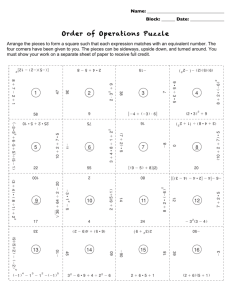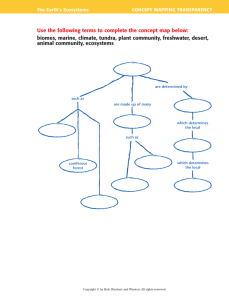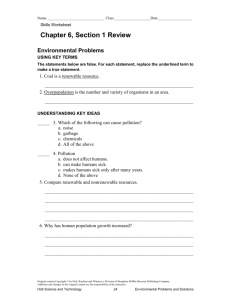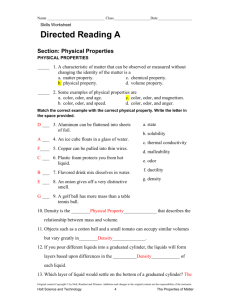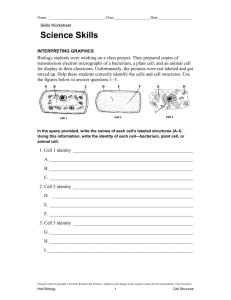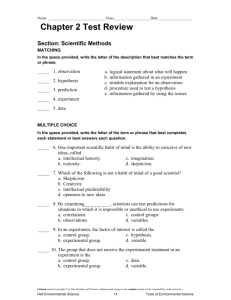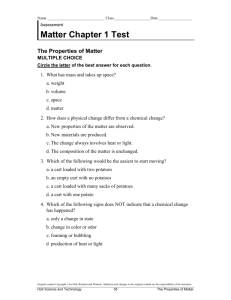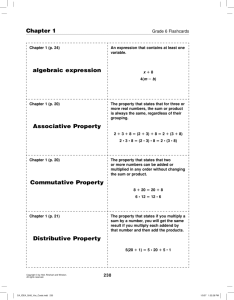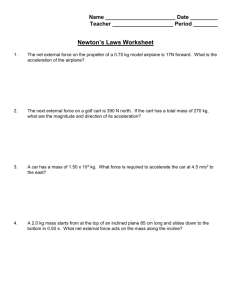SECTION 2 Continued
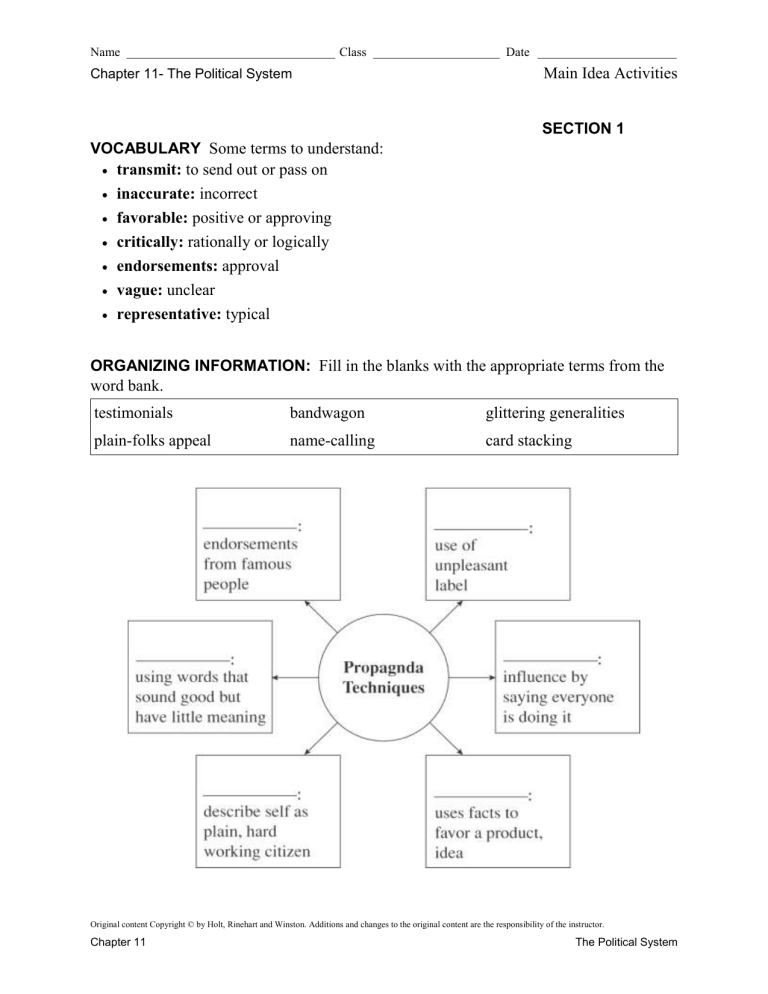
Name _________________________________ Class ____________________ Date ______________________
Chapter 11- The Political System Main Idea Activities
VOCABULARY Some terms to understand:
• transmit: to send out or pass on
• inaccurate: incorrect
• favorable: positive or approving
• critically: rationally or logically
• endorsements: approval
• vague: unclear
• representative: typical
SECTION 1
ORGANIZING INFORMATION: Fill in the blanks with the appropriate terms from the word bank. testimonials plain-folks appeal bandwagon name-calling glittering generalities card stacking
Original content Copyright © by Holt, Rinehart and Winston. Additions and changes to the original content are the responsibility of the instructor.
Chapter 11 The Political System
Name _________________________________ Class ____________________ Date ______________________
Chapter 11- The Political System Main Idea Activities
SECTION 1 CONTINUED
EVALUATING INFORMATION: Mark each statement T if it is true or F if it is false. If false, explain why and write the page number where you found the information:
____ 1.
Public opinion refers to one person’s opinion.
____ 2.
Our family and friends shape our opinions.
____ 3.
Growth of the mass media and advances in technology have decreased the amount of propaganda.
____ 4.
Both a representative and unrepresentative sample of people yields the same results.
____ 5.
Plain-folks appeal propaganda is designed to show the public that the candidate is just like them.
____ 6.
Testimonials often involve famous people.
REVIEWING FACTS: Use one of the section’s key terms to complete each statement below.
1.
Using a _____________________, or survey, is one way to measure public opinion.
2.
__________________________ is defined as the total of the opinions held concerning a particular issue.
3. In general, spreading ideas to influence people is called _____________________.
4. Forms of __________________________ include newspapers, television, radio, films, books, and magazines.
Original content Copyright © by Holt, Rinehart and Winston. Additions and changes to the original content are the responsibility of the instructor.
Chapter 11 The Political System
Name _________________________________ Class ____________________ Date ______________________
Chapter 11- The Political System Main Idea Activities
VOCABULARY Some terms to understand:
• consumers: customers
• sponsor: support
• supply: to provide
• contribution: donation
• evidence: proof
SECTION 2
ORGANIZING INFORMATION: Lobbyists use a number of different methods to promote the actions they seek. Think of three examples of what a lobbyist might say to promote his or her beliefs, and fill in the callout boxes.
Original content Copyright © by Holt, Rinehart and Winston. Additions and changes to the original content are the responsibility of the instructor.
Chapter 11 The Political System
Name _________________________________ Class ____________________ Date ______________________
Chapter 11- The Political System Main Idea Activities
SECTION 2 Continued
EVALUATING INFORMATION: Mark each statement T if it is true or F if it is false. If false, explain why and write the page number where you found the correct information:
______ 1. Interest groups attempt to influence the government as well as public opinion.
______ 2. Public interest groups promote the interests of a small portion of the public.
______ 3. Interest groups differ in size and budgets, but not goals.
______ 4. Lobbyists always work independently.
______ 5. One issue many interest groups struggle over is the minimum wage law.
______ 6. Lobbyists are not required to reveal to the government who they work for.
______ 7. Business organizations, labor unions, and teachers’ associations are examples of interest groups.
______ 8. Some lobbyists are former members of the state legislatures or public agencies they now seek to influence.
UNDERSTANDING MAIN IDEAS: For each of the following, write the letter of the best choice in the space provided. Write down the page number where you found the information.
______ 1. Which of the following is an example of an non-economic issue-oriented interest group?
a. the National Association for the Advancement of Colored People
b. the United Mine Workers of America
c. the National Association of Manufacturers
d. the American Farm Bureau Federation
______ 2. Perhaps the most important job of a lobbyist is to:
a. introduce new bills.
b. buy lunch for legislators.
c. keep secrets from Congress.
d. supply lawmakers with information.
Original content Copyright © by Holt, Rinehart and Winston. Additions and changes to the original content are the responsibility of the instructor.
Chapter 11 The Political System
Name _________________________________ Class ____________________ Date ______________________
Chapter 11- The Political System Main Idea Activities
______ SECTION 2 Continued
______ 3. In order to influence public opinion, interest groups might
a. place ads in mass media.
b. promise to help government officials in elections.
c. urge people to send letters to public officials.
d. all of the above
Original content Copyright © by Holt, Rinehart and Winston. Additions and changes to the original content are the responsibility of the instructor.
Chapter 11 The Political System
Name _________________________________ Class ____________________ Date ______________________
Chapter 11- The Political System Main Idea Activities
VOCABULARY Some terms to understand:
• eligible: qualified
• vital: very important
• preservation: protection
• prohibit: not allow
• apathy: lack of interest or concern
SECTION 3
ORGANIZING INFORMATION: Fill in the blank boxes in the graphic organizer below with ways citizens can participate in government.
Original content Copyright © by Holt, Rinehart and Winston. Additions and changes to the original content are the responsibility of the instructor.
Chapter 11 The Political System
Name _________________________________ Class ____________________ Date ______________________
Chapter 11- The Political System Main Idea Activities
SECTION 3 CONTINUED
EVALUATING INFORMATION Mark each statement T if it is true or F if it is false. If
False, explain why and write down the page number where you found the information.
____ 1. Almost every American citizen votes in elections.
____ 2.
Interest groups are prohibited by law from contributing money directly to candidates.
____ 3. Citizen involvement hinders democracy.
____ 4. Volunteers usually get paid for their work.
____ 5. People fail to vote because of apathy or illness.
____ 6.
One person’s vote does not count.
____ 7. You must be 18 years old to vote.
_____ 8. The number of political action committees has decreased in recent years.
____ 9.
When people vote for certain candidates, they are expressing their opinions about the candidates’ leadership and the programs that they support.
____ 10. Interest groups may provide volunteers to help candidates who are sympathetic to their causes.
Original content Copyright © by Holt, Rinehart and Winston. Additions and changes to the original content are the responsibility of the instructor.
Chapter 11 The Political System
